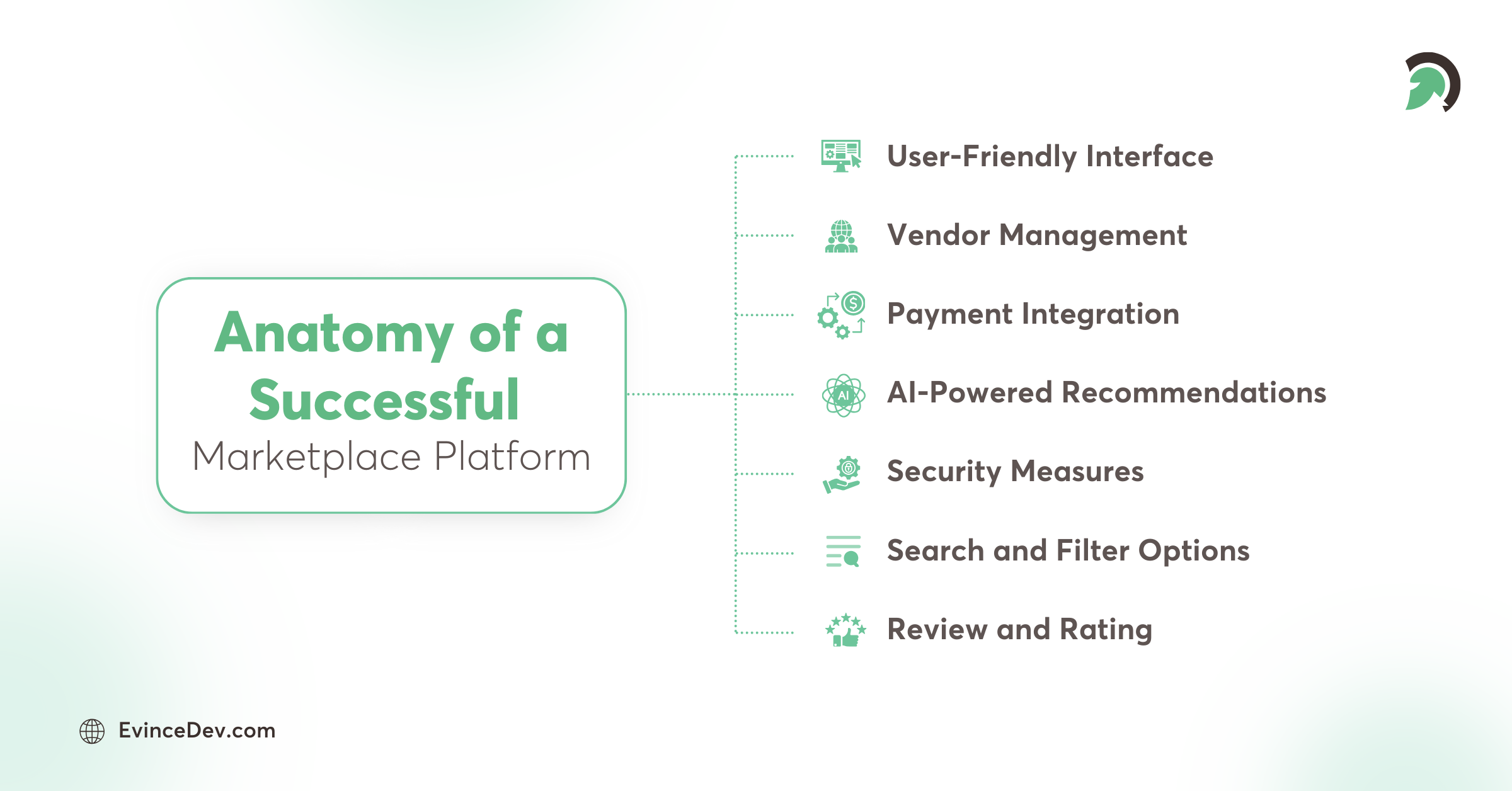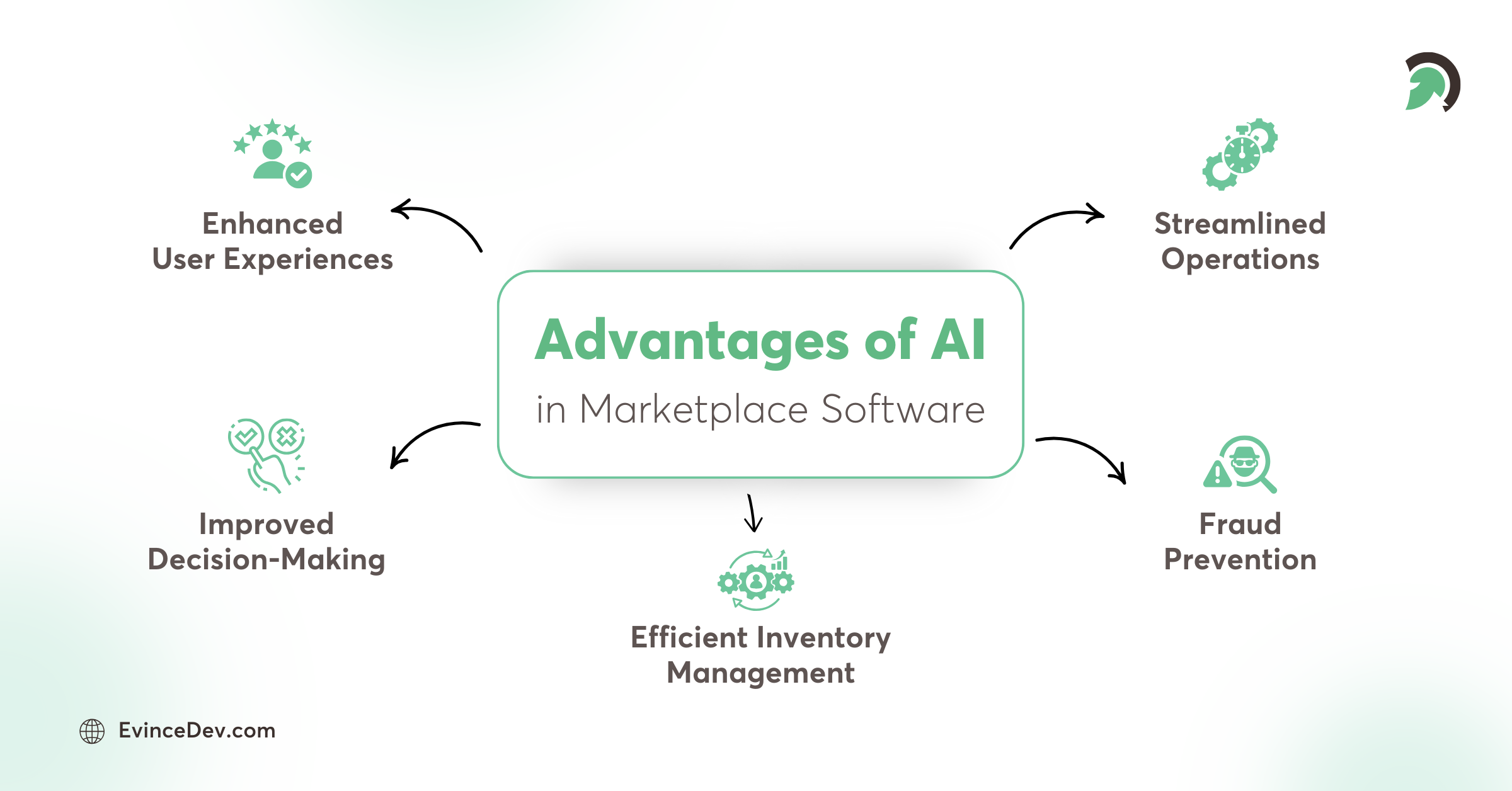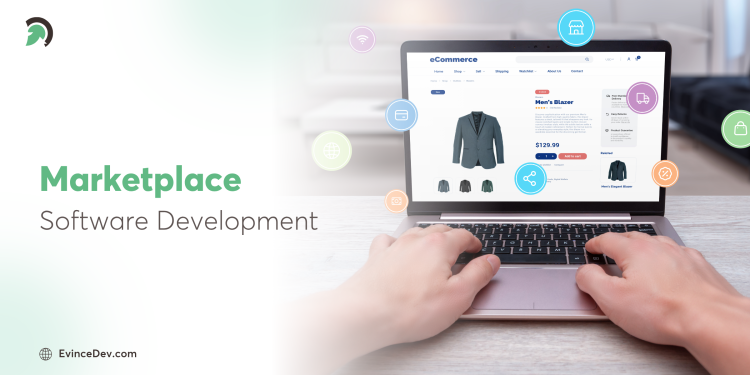The demand for Marketplace Software Development has surged as businesses recognize its potential to boost revenue streams effectively. A marketplace connects buyers and sellers on a single platform, fostering streamlined transactions and seamless user experiences. Building a multi-vendor platform involves several critical stages, each requiring precision and innovation. Businesses can create unique features tailored to their target audience by leveraging custom software development.
The Mobile Commerce Market size is estimated at USD 1.45 trillion in 2024 and is expected to reach USD 1.99 trillion by 2029, growing at a CAGR of 6.54% during the forecast period (2024-2029).
7 Proven Strategies for Successful Marketplace Software Development
Before diving into technical implementation, it’s essential to understand the key strategies that make a marketplace thrive. These proven approaches ensure your platform is scalable, secure, and user-centric — setting the foundation for long-term success.
1. Define a Clear Business Model
Start with a clear understanding of your target audience and platform type — whether B2B, B2C, or C2C. A well-defined model guides your feature set, monetization approach, and overall platform design, ensuring every decision aligns with your business goals.
2. Prioritize User Experience (UX)
User experience can make or break a marketplace. Focus on intuitive navigation, responsive design, and frictionless transactions. Great UX builds trust and keeps both buyers and sellers engaged.
3. Leverage Scalable Architecture
Choose a cloud-native or microservices architecture to ensure smooth scalability. This allows your platform to handle traffic spikes, integrate new modules easily, and support future feature expansion without downtime.
4. Integrate AI and Automation
AI improves personalization, streamlines vendor management, and powers features like product recommendations and fraud detection. Automation ensures operational efficiency by reducing manual workloads.
5. Strengthen Security and Compliance
Security builds credibility. Implement end-to-end encryption, two-factor authentication, and GDPR compliance to protect user data and minimize vulnerabilities.
6. Adopt Agile Development Practices
Using Agile methodology allows rapid iterations and continuous improvement. Regular feedback loops between developers, vendors, and users help refine the platform quickly and effectively.
7. Choose the Right Technology Partner
Partner with an experienced software development company that specializes in building marketplace solutions. Their expertise in architecture, scalability, and AI integration ensures your vision translates into a functional, future-ready product.
Understanding Marketplace Software Development
Marketplace software is the backbone of online platforms, enabling the efficient management of vendors, products, and transactions. Skilled online marketplace software developers play a vital role in building and optimizing these platforms for scalability and performance. Custom software development ensures your marketplace stands out, meeting industry-specific requirements while maintaining scalability. Leveraging modern software development tools can accelerate development, ensuring quality and efficiency.
A marketplace platform can cater to various industries, including eCommerce, real estate, healthcare, and education. By integrating advanced technologies such as AI and machine learning, these platforms can deliver highly personalized user experiences. Additionally, marketplace software ensures seamless communication between stakeholders, further streamlining operations.
Key Elements of a High-Performing Marketplace Platform

User-Friendly Interface
A user-friendly interface is essential for a seamless marketplace experience, catering to buyers and sellers. Simplified navigation ensures users can access the features they need without frustration. Responsive design makes the platform accessible across devices, while an aesthetically pleasing layout enhances engagement, encouraging users to explore more products and services.
Vendor Management
Comprehensive vendor management tools empower sellers to handle inventory easily, manage orders, and track performance. Features like real-time analytics, product listing management, and automated notifications improve operational efficiency. Providing vendors with these tools not only boosts their productivity but also enhances the overall credibility and functionality of the marketplace.
Payment Integration
Integrating multiple payment gateways ensures users can transact seamlessly, enhancing their trust in the platform. Support for various currencies allows global reach, while secure payment methods protect user data. Transparent transaction processes and features like automated receipts add convenience, making the marketplace a reliable option for buyers and sellers.
AI-Powered Recommendations
Using AI-driven recommendations enhances user experiences by providing personalized suggestions based on browsing history and preferences. This feature increases the likelihood of conversions, as users are shown products they will most likely purchase. Additionally, AI algorithms continuously learn and adapt, ensuring that recommendations remain relevant and accurate over time.
Security Measures
Robust security features are non-negotiable for any marketplace platform, safeguarding sensitive user information. Features like end-to-end encryption, two-factor authentication, and regular vulnerability assessments prevent unauthorized access. Secure transactions build trust, encouraging users to share their information confidently while adhering to compliance standards for data protection.
Search and Filter Options
Advanced search and filter functionalities enable users to find the products or services they need quickly and efficiently. Filters based on price, location, category, and vendor ensure a targeted search experience. This feature significantly enhances user satisfaction and engagement by reducing the time and effort spent on browsing.
Review and Rating Systems
A transparent review and rating system builds trust among users by providing insights into the quality of vendors and products. Encouraging honest feedback helps maintain high standards, while visible ratings influence purchasing decisions. Its feature improves accountability and fosters community within the marketplace ecosystem.
Software Development Trends Shaping Marketplaces
In today’s rapidly evolving digital landscape, staying ahead in marketplace software development requires leveraging emerging trends. Here are key innovations driving the transformation of marketplace platforms:
- AI-Driven Custom Software Development: Transforms user experiences with personalized features while improving operational efficiency through intelligent automation, ensuring marketplaces stay competitive and responsive to user needs.
- Microservices Architecture: Provides the flexibility to scale seamlessly, ensuring marketplaces efficiently handle increasing user demands and adapt to evolving business requirements without system overhauls.
- Blockchain Technology: Enhances transparency and security in marketplace transactions, fostering user trust while reducing fraud risks through decentralized and immutable data records.
- Progressive Web Apps (PWAs): Delivers seamless, app-like experiences via web browsers, offering faster access and reducing reliance on platform-specific apps for a broader audience reach.
- IoT Integration: Revolutionizes operations with real-time inventory tracking and smart logistics, enhancing efficiency and customer satisfaction through automated and connected marketplace ecosystems.
From Strategy to Execution: Steps to Create Marketplace Software
1. Conduct Market and Competitor Research
Begin by understanding your audience and evaluating existing competitors. Identify gaps in current platforms, study pricing models, and analyze customer expectations. This research ensures your product stands out and solves genuine market needs.
2. Define the Business Model and Revenue Streams
After validating your idea, finalize whether your marketplace will be B2B, B2C, or P2P. Decide on revenue generation models; such as commissions, subscriptions, or listing fees; that best fit your goals and user behavior.
3. Design the User Experience (UX)
Map out user journeys for buyers and sellers. Create wireframes and prototypes using tools like Figma or Adobe XD to visualize the platform early. A simple, aesthetic, and conversion-optimized design builds trust and engagement.
4. Plan and Prioritize Core Features
Create a roadmap distinguishing between MVP (Minimum Viable Product) features and future enhancements.
Core marketplace features typically include:
- Multi-vendor registration and management
- Product listings with search and filter options
- Secure payment gateways
- Review and rating systems
- Real-time notifications and dashboards
5. Choose the Right Tech Stack
Select a tech stack that balances performance and scalability.
Common choices include:
- MERN (MongoDB, Express, React, Node.js) – For dynamic and real-time marketplaces.
- MEAN (MongoDB, Express, Angular, Node.js) – For large-scale enterprise-grade platforms.
- LAMP (Linux, Apache, MySQL, PHP) – For simpler, cost-effective projects.
Consulting with a reliable software development partner ensures you choose the right combination for your goals.
6. Develop, Test, and Iterate
Use an Agile development approach with multiple sprints. Start with a working prototype, test for usability and performance, and gather feedback. Continuous QA testing both manual and automated; guarantees a stable and secure product.
7. Launch, Analyze, and Optimize
Launch your marketplace with a beta release to gather user insights. Use AI-powered analytics to track engagement, conversion, and vendor activity. Post-launch, update the platform regularly to introduce new features and maintain peak performance.
Leveraging AI Custom Software Development for Marketplaces
Artificial Intelligence has transformed marketplaces’ operations by automating processes and delivering personalized user experiences. AI custom software development integrates features like chatbots, predictive analytics, and fraud detection systems. These enhancements streamline operations, reduce costs, and boost customer satisfaction.

Enhanced User Experiences
AI in marketplace software analyzes user behavior, preferences, and purchasing patterns to deliver tailored experiences. It enables personalized product recommendations, enhancing satisfaction and boosting conversion rates. AI-powered search capabilities improve accuracy and efficiency, allowing users to find relevant products effortlessly. Intelligent algorithms create dynamic pricing strategies, adjusting prices based on demand, competition, and user interest. These advanced features keep users engaged and improve retention rates, making AI an indispensable tool for customer-centric marketplaces.
Streamlined Operations
AI automates repetitive and time-consuming tasks in marketplace software, significantly reducing operational inefficiencies. Tasks such as inventory management, order processing, and customer support can be handled swiftly by AI-driven tools. Machine learning algorithms optimize logistics by predicting demand and streamlining supply chains. Automated fraud detection systems identify suspicious activities in real time, minimizing risks and maintaining platform integrity. This automation enhances operational efficiency and allows businesses to focus on innovation and growth.
Improved Decision-Making
AI-powered predictive analytics offers actionable insights into user behavior, market trends, and vendor performance. These insights enable businesses to make informed decisions, such as launching new products or entering untapped markets. AI tools quickly analyze vast amounts of data, identifying patterns and correlations that are impossible for humans to detect. Real-time analytics provide instant feedback on marketing campaigns and pricing strategies, enabling continuous optimization. By leveraging AI, businesses can adapt to market changes proactively and remain competitive.
Fraud Prevention
Fraud detection in marketplace software ensures secure transactions and maintains user trust. AI-powered systems monitor user activities and transaction patterns, identifying anomalies that indicate potential fraud. Machine learning models continuously learn from new data, improving their ability to detect fraudulent behavior over time. Features like biometric authentication, behavioral analysis, and transaction monitoring provide multi-layered security. By integrating AI-driven fraud prevention, marketplaces can safeguard sensitive information and protect users from cyber threats.
Efficient Inventory Management
AI simplifies inventory management by predicting demand, tracking stock levels, and automating replenishment processes. Analyzing historical data and market trends helps businesses avoid overstocking or understocking. Real-time tracking systems provide insights into inventory status, enabling faster responses to supply chain disruptions. AI-powered tools also optimize warehouse operations, improving storage efficiency and reducing operational costs. This level of automation ensures that marketplace platforms run smoothly and meet user demands consistently.
AI also enhances customer support through intelligent chatbots and virtual assistants. These tools provide 24/7 support, resolving user queries promptly and efficiently.
Software Development Tools for Marketplace Platforms
Using modern software development tools significantly accelerates the creation and management of marketplace software. Popular tools include:
- Figma: Ideal for designing user interfaces focusing on collaboration and rapid prototyping.
- Jira: Helps track development progress, assign tasks, and maintain agile workflows.
- Postman: Simplifies API testing, ensuring seamless integration of third-party services into your platform.
- Docker: Enhances scalability by containerizing applications, making them easier to deploy and manage.
- Kubernetes: Manages containerized applications, ensuring high availability and optimal performance.
- Visual Studio Code: A versatile code editor with extensive extensions for various programming languages and frameworks.
- Slack: Facilitates team communication and collaboration, streamlining project workflows.

Why Custom Software Development Matters?
Custom software development tailors marketplace software solutions to the specific needs of your platform, enhancing competitiveness and user satisfaction. Unlike off-the-shelf solutions, custom platforms adapt to your business model, providing flexibility and scalability. Collaborating with a software development company ensures expert guidance throughout the process.
Custom software development also allows seamless integration with existing systems, enhancing overall efficiency. It enables businesses to address unique challenges and capitalize on opportunities specific to their industries.
Challenges in Marketplace Software Development
- Scalability: Managing a growing number of users and transactions requires robust infrastructure and advanced software development techniques.
- Security: Ensuring data protection and compliance with regulations is critical to building user trust.
- Cost Management: Balancing development costs with feature richness and quality demands meticulous planning.
- User Adoption: Attracting users and vendors to your platform requires effective marketing and onboarding strategies.
- Third-Party Integration: Ensuring compatibility with third-party tools and services can be complex but essential for functionality.
Tips for Overcoming Challenges
- Partner with an experienced software development company to navigate technical complexities effectively.
- Invest in comprehensive testing to identify and resolve issues before launch.
- Regularly update your platform to meet evolving software development trends and user expectations.
Partner with EvinceDev for Marketplace Software Development
today’s software development marketplace demands expertise, innovation, and the latest software development tools. By leveraging custom software development and AI-driven features, your platform can deliver unparalleled user experiences. As a trusted software development company in the USA, EvinceDev offers end-to-end solutions tailored to your needs. With years of experience in software development, we ensure your marketplace software meets industry standards and exceeds expectations.
Contact EvinceDev today to transform your vision into a thriving multi-vendor platform. Whether you need help with AI custom software development, adopting new software development trends, or optimizing your existing platform, our team is ready to assist. Trust EvinceDev to turn your marketplace ambitions into reality!




